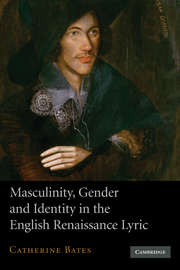Book contents
- Frontmatter
- Contents
- Acknowledgements
- List of abbreviations
- Chapter 1 Introduction
- Chapter 2 Masochism in Astrophil and Stella
- Chapter 3 Fort! Da! The phallus in ‘What tongue can her perfections tell?’
- Chapter 4 Abjection and melancholia in The Ocean to Cynthia
- Chapter 5 Feminine identifications in A Lover's Complaint
- Chapter 6 The lesbian phallus in Sapho to Philaenis
- Index
Chapter 1 - Introduction
Published online by Cambridge University Press: 22 September 2009
- Frontmatter
- Contents
- Acknowledgements
- List of abbreviations
- Chapter 1 Introduction
- Chapter 2 Masochism in Astrophil and Stella
- Chapter 3 Fort! Da! The phallus in ‘What tongue can her perfections tell?’
- Chapter 4 Abjection and melancholia in The Ocean to Cynthia
- Chapter 5 Feminine identifications in A Lover's Complaint
- Chapter 6 The lesbian phallus in Sapho to Philaenis
- Index
Summary
Plangent Petrarchan lovers berated by love, belaboured by sorrow, yet somehow begging for more; mournful elegists unable to part with the object they have lost, obsessively fingering their wounds; lachrymose cross-dressers who not only play the woman's part but ventriloquize the voice of feminine suffering, abandonment, and complaint: Renaissance lyric is populated by such figures who appear by choice to defy the period's model of a phallic, masterly masculinity – these adopted positions of impotence, failure, and gendered discontent seeming wilfully to pervert what might otherwise have been seen (indeed, might thereby be defined) as the patriarchal norm. A ‘turning aside from truth or right’ is how the OED defines perversion, its illustrative quotation from Sir Francis Bacon suggesting a monstrous overturning of the habitual order of things: ‘women to govern men … slaves freemen … being total violations and perversions of the laws of nature and nations’. Apparently doing all in their power to relinquish masculine agency, to submit to emotional states of loss they neither hope nor wish to overcome, to enslave themselves to their mistresses, if not to become enslaved themselves, these figures pointedly deviate from an axiomatically empowered, active, forceful masculinity, and suggest that, as Kaja Silverman writes (commenting on the same dictionary definition and illustrative quotation), perversion ‘turns aside not only from hierarchy and genital sexuality, but from the paternal signifier, the ultimate “truth” or “right”’.
- Type
- Chapter
- Information
- Publisher: Cambridge University PressPrint publication year: 2007



